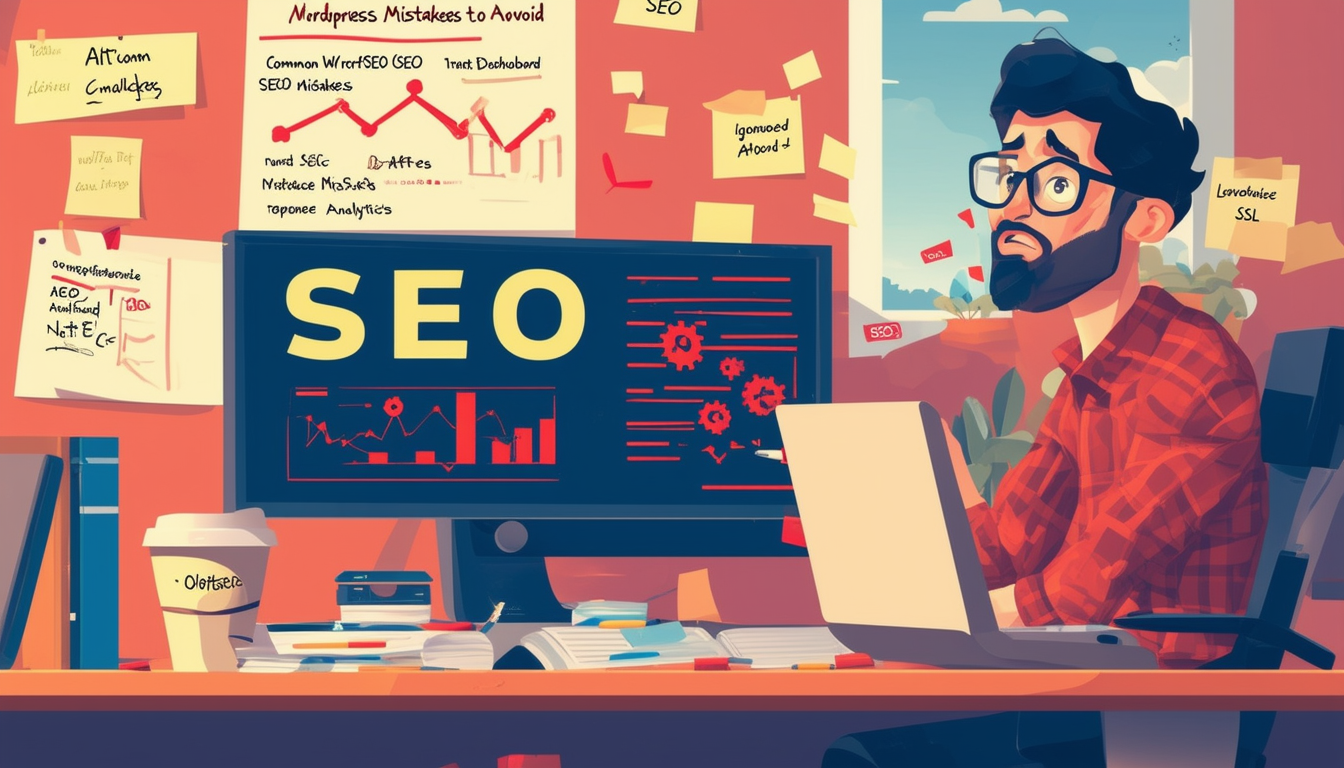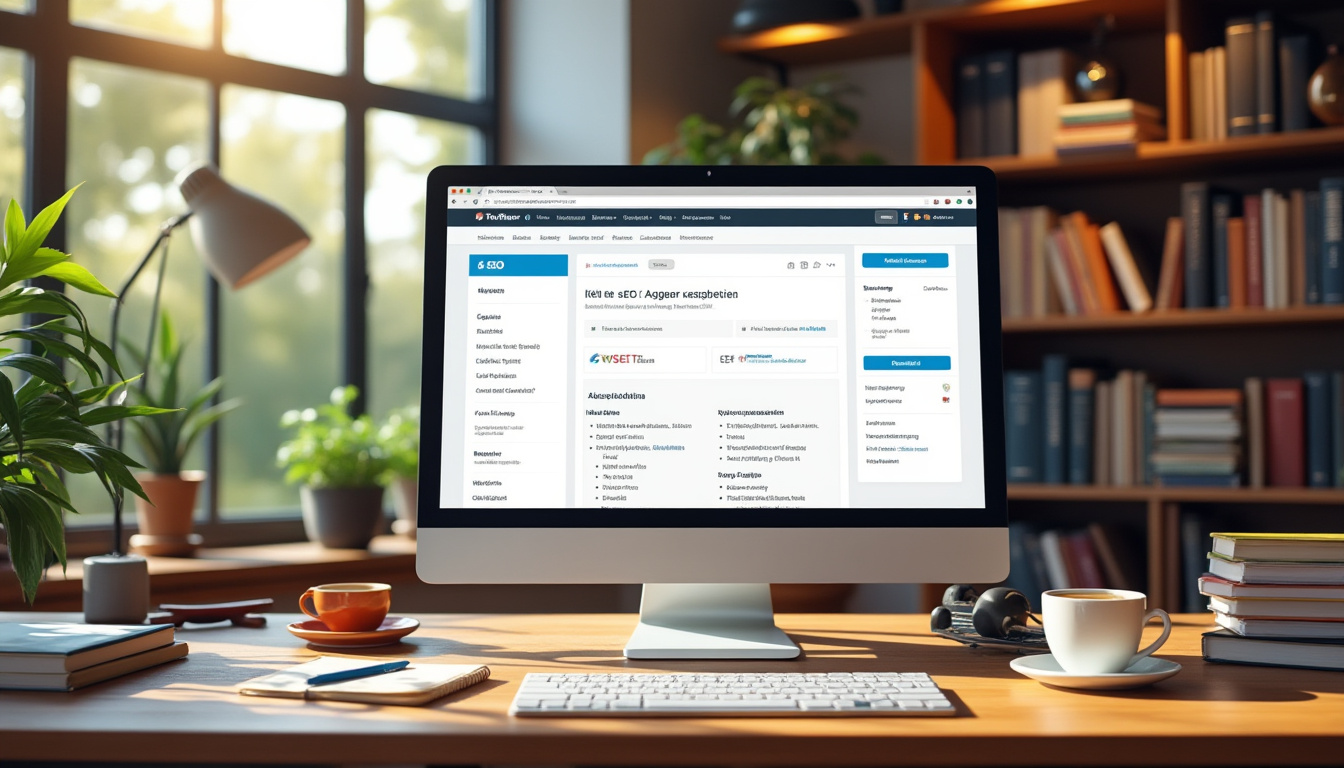When managing a WordPress site, avoiding SEO mistakes is critical for optimal performance. Some common pitfalls include not using an efficient SEO plugin, which can impede your site’s search engine visibility. Additionally, neglecting to set the right permalinks complicates link structure, making it harder for search engines to crawl your content. Furthermore, skipping the creation of an XML sitemap can prevent search engines from discovering all your pages. Other mistakes involve poor keyword research, failing to optimize titles and meta tags, as well as ignoring image optimization. It’s also essential to address broken links and ensure fast loading times, as these factors significantly influence user experience and SEO rankings.
Search Engine Optimization (SEO) is a critical element for any WordPress site seeking to achieve high visibility in search engine results. However, many website owners inadvertently make fundamental mistakes that can hinder their site’s performance. This article details some of the most common WordPress SEO mistakes to avoid, providing clear explanations and actionable tips to enhance your website’s SEO strategy.
Neglecting the Importance of an SEO Plugin
One of the first mistakes that many WordPress users make is not using a dedicated SEO plugin. WordPress offers a range of powerful plugins designed to assist in optimizing your website for search engines. Without one, you may miss essential features such as meta tag optimization, sitemaps, and performance tracking. Popular plugins like Yoast SEO or All in One SEO can vastly improve your site’s chances of ranking higher.
Ignoring Permalinks Settings
Permalinks refer to the structure of your URLs. By default, WordPress generates URLs that are not SEO-friendly. Users often overlook this critical setting, which can lead to long, uneasily readable links. To enhance your SEO, you should adjust your permalink settings to include keywords and make them easy to read. Use a structure that includes your post title to help search engines understand what your content is about.
Failure to Submit an XML Sitemap
An XML sitemap is vital for assisting search engines in crawling your website. If you do not submit one, search engines may struggle to discover your content, thus impacting your SEO. Thankfully, most SEO plugins can automatically generate a sitemap for you. Once generated, ensure you submit it to Google Search Console to enhance your site’s visibility.
Overlooking Image Optimization
Images can significantly impact loading speeds and SEO rankings, yet many users fail to optimize their images before adding them to their site. Always ensure you compress your images, use descriptive file names, and include alt text. Alt text not only helps with SEO but also makes your images accessible to users with disabilities.
Not Implementing Proper Internal Linking
Internal linking is an often underrated yet crucial aspect of SEO. By linking to other pages or posts on your site, you provide additional context to search engines and improve navigation for users. However, many website owners neglect to do this effectively. Ensure that you create relevant links within your content to guide users to related discussions and further enhance SEO.
Failing to Conduct Keyword Research
Keyword research is essential for driving traffic. Many users aimlessly choose keywords or fail to include them in their content adequately. By overlooking this step, you miss opportunities to rank for relevant search terms. Utilize tools like Google Keyword Planner or Ahrefs to identify keywords appropriate for your niche and integrate them into your content strategically.
Neglecting Page Titles and Meta Descriptions
Many site owners make the mistake of using generic page titles and meta descriptions. These elements are crucial for SEO. They should encapsulate relevant keywords and provide a succinct summary of the page content. A well-crafted title and meta description encourage users to click through from search results, thus improving click-through rates and overall SEO performance.
Underestimating the Importance of Site Speed
In today’s fast-paced digital landscape, users expect websites to load quickly. A slow loading site leads to a poor user experience and can lead to high bounce rates, negatively impacting your SEO. Ensure your WordPress site is optimized for speed by leveraging caching plugins and optimizing your code and resources.
Ignoring Mobile Optimization
With the increasing use of mobile devices for browsing, Google has placed significant emphasis on mobile-first indexing. Failing to optimize your WordPress site for mobile can be detrimental to your SEO. Ensure your website is responsive, meaning it automatically adjusts to the screen size of any device.
Overusing or Misusing Keywords
While keywords are essential for ranking, overusing them—known as keyword stuffing—can lead to penalties from search engines. Instead, focus on incorporating keywords naturally throughout your content. Aim for a balanced approach by using synonyms and related phrases to enhance your content’s relevance without compromising on readability.
Not Regularly Updating Content
SEO is not a one-time task; it’s an ongoing process. Many users neglect to update their content regularly, leading to outdated information that can harm SEO rankings. Regularly revisiting and refreshing your old posts, by adding new information or optimizing for current trends, can significantly benefit your site’s SEO efforts. Use Google Analytics to identify content that drives traffic and consider updating it when necessary.
Failing to Fix Broken Links
Broken links can severely impact both user experience and SEO rankings. Many website owners fail to regularly check their sites for broken links, which can lead to frustration for visitors and loss of credibility. Use tools like Screaming Frog or search engine console reports to identify and fix these broken links promptly.
Ignoring SSL Certification
Having an SSL certificate installed on your WordPress site is essential today. Without it, not only may users trust your site less, but Google has also confirmed that SSL is a ranking factor. Https ensures that the data exchanged between your server and your users’ browsers remain secure and builds greater trust with your audience.
Overlooking User Experience (UX)
Good SEO goes hand in hand with an excellent user experience. Many site owners focus solely on SEO tactics while neglecting UX elements. Ensure that your site is easy to navigate, visually appealing, and accessible. User experience influences bounce rates and conversions, which in turn can affect your SEO results.
Not Utilizing Social Media Integration
Social signals can indirectly affect your SEO. Sites that generate high social engagement often rank better in search engine results. However, many WordPress users neglect to integrate social media sharing options on their products. Use plugins that allow easy sharing on different platforms to encourage visitors to share your content, enhancing exposure and potential backlinks.
Ignoring Analytical Data
Lastly, one of the most common SEO mistakes is failing to analyze performance data. Without monitoring your website’s analytics, you may miss critical insights into what’s working and what isn’t. Platforms like Google Analytics provide invaluable data about your visitors, their behavior, and how they interact with your site. Regularly review this data to refine your SEO strategies accordingly.
By avoiding these common WordPress SEO mistakes, you can significantly enhance your website’s performance, better engage your audience, and improve your chances of ranking higher in search engine results. Regularly audit your site, implement changes strategically, and stay updated with the latest SEO practices to ensure your WordPress website achieves optimal results.

When it comes to optimizing a WordPress site for search engines, many website owners unknowingly commit common SEO mistakes that can seriously impact their site’s performance and visibility. By recognizing and avoiding these blunders, you can significantly enhance your site’s search engine rankings and user experience. In this article, we will explore the prevalent mistakes often made on WordPress sites and provide practical tips on how to rectify them.
Additional Resources
To dive deeper into optimizing your WordPress SEO, consider checking out comprehensive guides and articles like this Semrush guide and common mistakes outlined by WP Download Manager. It’s also beneficial to analyze competitor strategies, which can provide valuable insights on improving your site’s SEO—explore further through this resource.
By avoiding these common WordPress SEO mistakes, you can ensure that your site is well-optimized and primed for better visibility in search engine results.
Poor Keyword Research
Keyword research is integral to successful SEO, yet many website owners either ignore it or choose irrelevant keywords. Failing to target the right keywords can lead to your content not being found by your ideal audience. Take the time to research and select keywords that align with your content and are frequently searched by users. Utilize tools like Google Keyword Planner or SEMrush for better insights.
Neglecting Page Titles and Meta Descriptions
Another common mistake is overlooking page titles and meta descriptions. These elements play a vital role in SEO by providing both search engines and potential visitors with a summary of your content. Ensure that each page has a unique and relevant title along with a captivating meta description that encourages users to click through to your site.
Ignoring Image Optimization
Images can enhance user experience, but if not optimized properly, they can slow down your site and hinder your SEO efforts. Failing to add alt text and not compressing the images can lead to poor performance. Always include descriptive alt text for images to help search engines understand their content and compress images to improve loading times.
Not Utilizing Permalinks Effectively
Your permalink structure is crucial for SEO. Default settings often result in lengthy and complex URLs that are not user-friendly or descriptive. Instead, opt for a cleaner permalink structure that includes your target keywords. This helps both users and search engines comprehend your content better. Adjusting this setting can easily be done in the WordPress dashboard under “Settings > Permalinks.”
Overlooking Broken Links
Broken links can damage your site’s credibility and negatively affect user experience. They can lead to high bounce rates, which search engines may interpret as a signal of low-quality content. Regularly check your site for broken links and rectify them promptly. Tools like Broken Link Checker can assist you in identifying these issues.
Failing to Submit an XML Sitemap
An XML sitemap is necessary for search engines to crawl your site efficiently. Without it, search engines may struggle to discover all your pages. Many SEO plugins, such as Yoast, generate XML sitemaps automatically. Ensure this feature is activated and submit the sitemap to Google Search Console to enhance your site’s indexing.
Common WordPress SEO Mistakes and Their Impact
| Mistake | Impact |
| Not using an SEO plugin | Limits optimization capabilities |
| Ignoring image optimization | Slower loading times and poor performance |
| Forgetting to set permalinks | Unfriendly URLs reduce search visibility |
| Overusing keywords | Can lead to penalties from search engines |
| Neglecting to fix broken links | Damages user experience and SEO rankings |
| Not submitting XML sitemap | Search engines struggle to index your site |
| Failing to optimize title tags | Reduces click-through rates |
| Ignoring mobile optimization | Poor user experience on mobile devices |
| Not using HTTPS | Security issues may affect rankings |
Optimizing your WordPress site for search engines is essential for improved visibility and traffic. However, many website owners make common SEO mistakes that can significantly hinder their site’s performance. In this article, we will explore these mistakes and provide actionable recommendations to help you avoid them and enhance your site’s SEO.
Not Using the Right SEO Plugin
One of the most fundamental errors is failing to use a quality SEO plugin. Without an effective plugin, you might miss out on optimizing various aspects of your website, such as meta tags and XML sitemaps. Look for reputable plugins like Yoast SEO or All in One SEO Pack to streamline your optimization efforts and ensure you cover all critical areas.
Improper URL Structures
Another common mistake involves using default WordPress permalink structures, which can include unsightly numbers and symbols. This not only confuses users but also lowers your SEO performance. Be sure to customize your permalinks to include keywords relevant to your content. This will make your URLs more user-friendly and easier for search engines to understand.
Ignoring Image Optimization
Images play a vital role in enhancing user experience, but they must be optimized correctly. Neglecting to add alt text and compress images can lead to slow-loading pages, frustrating users and impacting your search ranking. Make sure to use descriptive alt text, resize your images appropriately, and utilize plugins that can automate image compression.
Failure to Submit XML Sitemaps
Many website owners overlook the importance of submitting an XML sitemap to search engines. An XML sitemap acts as a roadmap of your site, allowing search engines to index your content effectively. Without it, search engines may miss crucial pages. Ensure that your SEO plugin generates a sitemap, and submit it to Google Search Console.
Underestimating Page Speed
In today’s fast-paced online environment, users expect swift page loading. A common mistake is not prioritizing page speed. A slow site can lead to high bounce rates and lower rankings. Use tools such as Google PageSpeed Insights to analyze your site’s speed and take actions such as enabling caching and reducing server response time to improve performance.
Poor Keyword Research
Effective keyword research is foundational for SEO success, and yet it’s often underestimated. Many website owners either target overly competitive keywords or fail to use long-tail keywords adequately. Utilize keyword research tools to find relevant keywords that match your content and audience intent, and use these strategically throughout your website.
Neglecting Meta Tags
Meta titles and descriptions are essential for telling search engines about your content. However, many website owners fail to write compelling meta tags, leading to missed opportunities for click-throughs. Write unique, descriptive meta titles and descriptions, and include relevant keywords to improve visibility in search results.
Excessive Use of Keywords
While incorporating keywords is crucial, overdoing it can lead to keyword stuffing, which search engines penalize. Aim for a natural keyword density in your content and ensure that your writing remains engaging and readable. Quality content should always be the priority over trying to manipulate search rankings.
Not Monitoring Performance
Finally, failing to monitor your website’s SEO performance can prevent you from recognizing areas for improvement. Regularly check your analytics to assess how users interact with your site and adjust your strategies based on this data. Tools like Google Analytics can provide insight into visitor behavior, helping you refine your SEO efforts over time.
Frequently Asked Questions about Common WordPress SEO Mistakes
A: Not using a suitable WordPress SEO plugin can significantly hinder your site’s performance.
A: Failing to conduct proper keyword research can lead to targeting the wrong audience and poor ranking.
A: Forgetting that faster loading times improve user experience and SEO rankings is a critical error.
A: Not submitting an XML sitemap prevents search engines from effectively crawling your website.
A: Not optimizing images for the web can slow down your site, affecting both user experience and search visibility.
A: Not setting proper permalinks can make it difficult for search engines to index your content properly.
A: Ignoring broken links can damage your site’s credibility and user experience, which are both essential for SEO.
A: Failing to use appropriate meta tags can result in missed opportunities to rank higher in search engine results.









